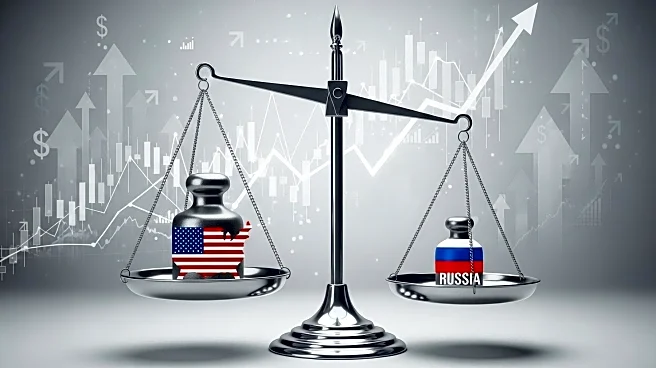What's Happening?
The U.S. Congress is exploring new economic measures to increase pressure on Russia as the conflict in Ukraine continues. Despite numerous sanctions from the European Union, United States, and United Kingdom, Russia's economy has shown resilience, with military spending contributing to growth. However, inflation and interest rates remain high, and the budget deficit is widening. The proposed Sanctioning Russia Act, which includes a 500% tariff on Russian energy exports, aims to halt Russian exports and impact its economy significantly. Additionally, discussions in Europe consider using Russia's frozen assets to fund a substantial loan to Ukraine, signaling long-term support for Kyiv. Experts suggest smarter penalties and enforcing existing sanctions more effectively to curb Russia's war efforts.
Why It's Important?
The proposed economic measures could significantly impact Russia's ability to sustain its military operations in Ukraine. By targeting Russia's energy exports and utilizing frozen assets to support Ukraine, the U.S. and its allies aim to weaken Russia's economic foundation and bolster Ukraine's defense capabilities. These actions could shift the balance in the ongoing conflict, potentially forcing Russia to reconsider its strategy. The measures also highlight the international community's commitment to supporting Ukraine and maintaining pressure on Russia, which could influence future diplomatic negotiations and geopolitical dynamics.
What's Next?
If the Sanctioning Russia Act is passed, it could lead to a substantial decrease in Russian energy exports, affecting global energy prices. The proposed loan to Ukraine using frozen Russian assets may strengthen Ukraine's military capabilities and prolong its resistance against Russian aggression. The U.S. and its allies may continue to explore additional sanctions and economic measures to further pressure Russia. The effectiveness of these strategies will depend on international cooperation and the ability to enforce existing sanctions more rigorously.
Beyond the Headlines
The economic measures against Russia raise ethical and legal questions regarding the use of frozen assets and the impact on global energy markets. Encouraging a brain drain from Russia could exacerbate its labor shortages, affecting its long-term economic stability. The ongoing conflict and sanctions may lead to shifts in international alliances and trade relationships, influencing global economic and political landscapes.









